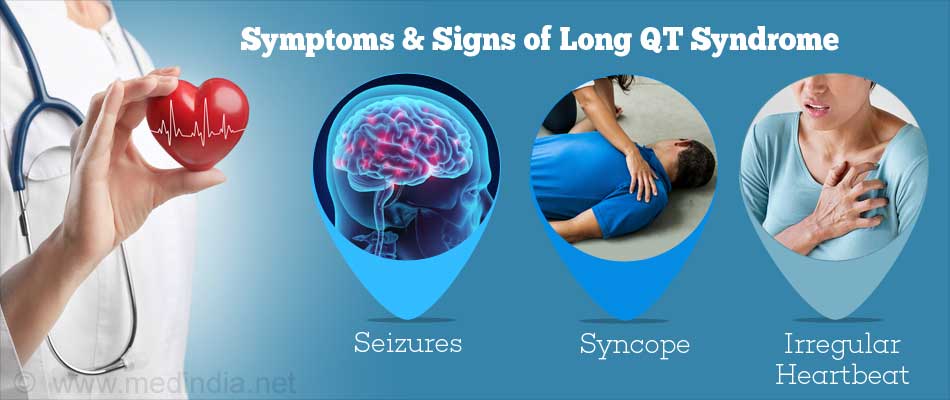- Long QT syndrome - (http://www.nhs.uk/conditions/long-qt-syndrome/pages/introduction.aspx)
- What is long QT syndrome - (https://www.nhlbi.nih.gov/health/health-topics/topics/qt)
- Nakano Y, Shimogaki W. Genetics of long QT. J Hum Genet. 2016;61(1):51-55. Summarizes recent developments in Long QT genetic testing.
What is Long QT Syndrome?
Long QT syndrome is a heart condition that causes uncontrolled arrhythmias. It is the most common cause of unexplained deaths and affects approximately 1 in every 2000 individuals. People with long QT syndrome have a structural defect in the ion channels of their heart muscle. A defect in these ion channels causes an abnormality in their heart’s electric conduction system. This defect in their heart makes them prone to having uncontrollable, fast and chaotic heartbeats (arrhythmias).
With every heartbeat, an electrical signal impulse is passed from the top to the bottom of the heart. This electric signal causes the heart to contract and pump blood. This pattern of electrical signaling in each heartbeat can be seen in an electrocardiogram (ECG)in the form of five separate waves: P, Q, R, S and T. A QT interval is a measurement of time between the start of the Q wave and the T wave and it represents the time taken by the heart muscles to relax after contracting to pump blood. In individuals with long QT syndrome, this QT interval is longer than normal, thereby disturbing the heart’s rhythm and causing arrhythmias.
Genetics & Long QT Syndrome
There are at least 17 genes known to cause long QT syndrome. Mutations in these genes are associated with the structure and functioning of the ion channels in the heart muscles. There are 17 types of long QT syndrome, each associated with one gene. These are sequentially numbered as, LQT1 (long QT syndrome type 1), LQT2 (long QT syndrome type 2), LQT3 (long QT syndrome type 3) and so on. LQT1 to LQT15 are collectively known as the Romano-Ward syndrome and are inherited in an autosomal dominant manner. In autosomal dominant inheritance, a mutation in one copy of the gene is sufficient to cause the condition.
A rare form of long QT syndrome known as Jervell and Lange–Nielsen syndrome is associated with congenital deafness along with a prolonged QT interval. This has two types, JLN1 and JLN2, depending on the gene involved. Jervell and Lange–Nielsen syndrome is inherited in an autosomal recessive manner, which means that both copies of the gene must be mutated to cause the condition.
What are the Causes & Risk Factors of Long QT Syndrome?
Causes of long QT syndrome
Long QT syndrome is often inherited, which means that it is caused due to a mutation in one of the 17 genes associated with long QT syndrome. Sometimes long QT syndrome can also be drug induced, which means that it is caused due to the effect of certain medications on the heart’s rhythm.
More than 17 medications, including some common ones, can prolong the QT interval in healthy individuals thus causing long QT syndrome. These include certain
Antiarrhythmic medications: Sotalol, Amiodarone, Dofetilide, Quinidine, Procainamide, Disopyramide
Antibiotics: Erythromycin, Clarithromycin, Levofloxacin
Antidepressant medications: (Amitryptyline, Doxepin, Desipramine, Clomipramine, Imipramine
Antipsychotic medications: Thioridazine, Chlorpromazine, Haloperidol, Prochlorpherazine, Fluphenazine
Antihistamines: Terfenadine , Astemizole
Diuretics, cholesterol medications and certain diabetes medications.

Risk factors of long QT syndrome
There are various factors that determine a person’s risk of having long QT syndrome.
You are at risk of long QT syndrome if:
- You or a family member has a history of unexplained fainting or seizures, drowning or near drowning incidents, unexplained accidents or deaths, or cardiac arrest at a young age.
- Your close relative is diagnosed with long QT syndrome.
- You are taking medications that are known to cause long QT syndrome.
- If you have low levels of calcium, potassium or magnesium in your blood.
People suffering from long QT syndrome often remain undiagnosed or are given a misdiagnosis of seizure disorders. Therefore it is important to keep these key risk factors in mind to facilitate accurate diagnosis.
What are the Symptoms of Long QT Syndrome?
The symptoms of long QT syndrome are often seen first in childhood. However, these can start anytime in a person’s life from birth to old age or never at all. These symptoms include:
- Syncope: Syncope (fainting) is the most common symptom seen in individuals with long QT syndrome. This occurs when there is a limited supply of blood to the brain due to the temporary erratic beating of the heart.
- Seizures: When the heart continues to beat erratically for a prolonged period, the brain becomes more deprived of oxygen, thus resulting in seizures.
- Sudden death: If the heart does not return to its normal rhythm immediately after an arrhythmic attack, it can lead to sudden death.
- Arrhythmia during sleep: People who have long QT syndrome type 3 can experience irregular heartbeat during sleep.

How do you Diagnose Long QT Syndrome?
Not everyone with long QT syndrome will show symptoms of the condition, which makes it difficult to diagnose. Therefore, it is important to use a combination of methods to identify individuals affected with long AQ syndrome.
Some methods used to diagnose long QT syndrome are:
- Electrocardiogram (ECG)
- Medical and Family History
- Genetic test result
Electrocardiogram
An ECG analyzes the electrical activity in the heart and helps determine the QT interval. This is done while the person is at rest and/or while the person is performing a stationary exercise. This test may need to be conducted several times, as the electrical activity of the heart may change from to time. Some doctors may attach a portable heart monitor to the chest, to monitor the heart’s activity for a 24 to 48 hour period.
Medical and Family History
An individual’s medical history and/or their family history of the symptoms and signs of long QT syndrome can help determine their chances of having the condition. Therefore your doctor or genetic counselor will take a detailed three generations family history to evaluate your risk of long QT syndrome.
Genetic Test Results
A genetic test analyzes an individual’s genes to check if they have a mutation in a gene associated with long QT syndrome. If a person is found to have a mutation in one of these genes, they will have the syndrome.
How do you Treat Long QT Syndrome?
The aim of the treatment and management of people with long QT syndrome is to prevent arrhythmia and syncope. The treatment may vary among individuals and it depends on the previous history of syncope and sudden cardiac arrest, the kind of type of long QT syndrome and their family history.
Treatment options for long QT syndrome
- Medications: Beta-blockers are medicines that prevent the heart from beating at a fast rate and may be given to prevent arrhythmias. In some cases, potassium and fish oil supplements are also prescribed to maintain a regular heart rhythm.
- Implantable devices: Pacemakers or implantable cardioverter-defibrillator (ICD)sare small devices that help control the heart rhythm. These are implanted under the skin of the chest or stomach through a minor procedure. If they detect any abnormality in the heart rhythm they send electrical impulses to instruct the heart to correct its rhythm.
- Surgery: In some people with long QT syndrome, the nerves that send messages to the heart to beat faster are surgically removed. This prevents the risk of sudden death.

How do you Prevent Long QT Syndrome?
Long QT syndrome is a lifelong condition and the risk of syncope or sudden cardiac arrest never goes away. However, there are a few preventive options that people with long QT syndrome can incorporate into their lives to reduce the risk of the complications associated with the syndrome.
To prevent abnormal heart rhythms, you should:
- Avoid activities that can induce an irregular heart rhythm. For example, strenuous exercises like swimming must be avoided as they can trigger arrhythmias.
- Medications that can cause arrhythmias should not be prescribed to individuals with long QT syndrome. Ask your doctor for a list of medications you should avoid.
- If you have an implanted pacemaker or ICD device, be careful when playing sports so that you don’t move the device from its location.
- Inform people you meet regularly about your condition so that they can help you if you have an emergency.
- Visit a cardiologist regularly.
Health Tips
- Know your body: Keep a check on your own symptoms and visit the doctor if you notice anything unusual.
- Visit doctor regularly: Follow your doctor’s advice carefully and go for regular check ups.
- Healthy lifestyle: Maintain a healthy lifestyle and avoid smoking and intake of alcohol to avoid added risk of heart conditions.
- Reduce sports activities: Avoid or reduce sports activities that tend to cause a constant fluctuation in heart rate.
- Medication: Be very careful and avoid medications that cause long QT syndrome. You must inform all your health care providers about your condition so that they do not prescribe you any medication that can cause arrhythmia.











